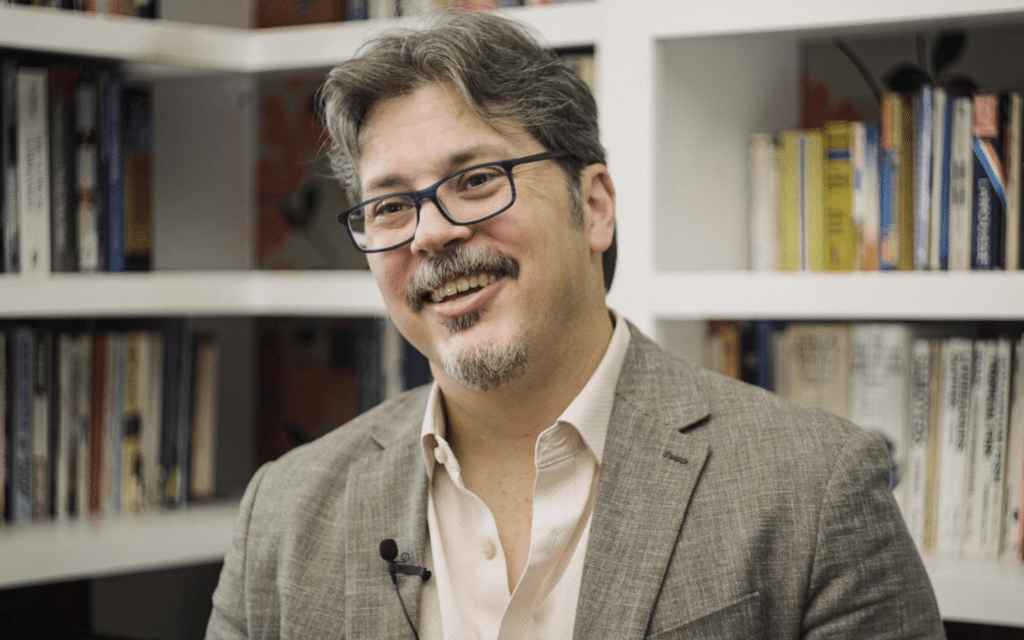
“I am happy to make bad movies – one a year until I die.” This is how documentary film Create or Die (2024) gets going, and the speaker – indie movie director David Axe (above) – is the subject of the film. However, any expectations that this film will offer something bigger and more profound about the nature of indie filmmaking – such as, perhaps, what motivates low-budget filmmakers as a group to keep doing what they do – doesn’t materialise. Rather, Create or Die keeps a very close focus on Axe himself, plus his regular crew, describing his most recent feature in some detail and at points ruminating on the reasons that he personally keeps going. Shorn of any knowledge or understanding of his own career to date (I haven’t seen anything he’s made, though I’m sure that kind of makes his point about the pitfalls of his career) the film can feel a little rootless.
After introductions, the film moves to promo for one of Axe’s projects, a film called Acorn (2023) which, although starting life as something else entirely, morphed into a film-within-a-film where the embedded film symbolically reflects the main character’s life. The main character in Acorn is a filmmaker too, who receives a terminal cancer diagnosis and decides she’s going to finish one more film in the time she has left. Having established this, Axe begins to discuss his background as a self-taught filmmaker, having at the point the documentary was filmed made seven films in seven years. This is an approach he intends to keep up until he ‘gets good at it’, though of course making a miniscule-budget feature every year isn’t the only way to get good at it; lots of indie filmmakers spend years prepping and making their films. There are different ways and means, though this method happens to be the one Axe has chosen (and he doesn’t really reflect on other options or get too far into defending his approach, which would have been interesting to hear).
The documentary, at this point, segues into a run of recollections from Axe and his crew members which are very specific to making Acorn – though could be extrapolated to many other low-budget projects, and may be of particular interest to filmmakers as a result. But there’s lots of detail about making Acorn: the length of the shoot, the length of the days, location scouting, the weather, the issues around what to prioritise when you have a list of a hundred tasks and time for ten of them; these specifics were lost on this reviewer, and from around the midway point this becomes, more or less, a documentary about Acorn, an unfamiliar film. As such, discussing excerpts from the script which are clearly intended to be very moving surely can’t do much for unfamiliar audiences. Yes, there are some deviations into the huge fail rate on indie projects, for example, and other topics which may have a broader appeal, but for the most part Create or Die is dominated almost entirely by talking heads talking about a specific film.
That’s fine, but as someone who runs a website which so often covers exactly the sorts of films being alluded to here, it feels like there are lots of questions which could have been asked and answered. An often rather po-faced Axe ponders, ‘Is it okay to be a bad filmmaker?’ before asserting that yes, yes it is. Okay, sure, but there are other complexities to explore here. As above: why exactly is churning out a film per year the best approach, given that making money is seen as largely impossible (albeit there are many baffling exceptions – remember Skinamarink)? What about audiences? What is your relationship with them? What about the issues of reaching an audience? Should we enjoy the story you are telling or – as it often seems here, whether fairly or otherwise – is it more for the personal validation of the director and team? Let’s assume a film is low-budget, but brilliant – what makes it so? Or if it is a ‘bad movie’, of which the best are those which are so-bad-they’re-good – something that can never be artificially engineered, by the way – why is it still an enjoyable experience? There seems to be some discrepancy here between declaring ‘indie films are ridiculous’ and ‘indie films are significant, profound and symbolic’, which could perhaps have been fleshed out by more overarching discussion.
Of course, I could be doing Create or Die the extreme disservice of judging it on what it never set out to be (though its title and blurb – without the addition of The Making of Acorn being carried on Amazon Prime – arguably do suggest it will consider the vexed question of cinema and creativity). As a film fan who has never been the other side of a camera, there does still seem to be a lot to learn about the process which isn’t in the remit here. No doubt the film’s focus will cost it a broader audience, too. As it stands however, Create or Die is a decently-edited film with a modest runtime, making a modest contribution to the world of behind-the-scenes filmmaking, though more about the specific experiences of a small team than the bigger picture at play.
Create or Die (2023) is available now on Amazon Prime and Xumo.
